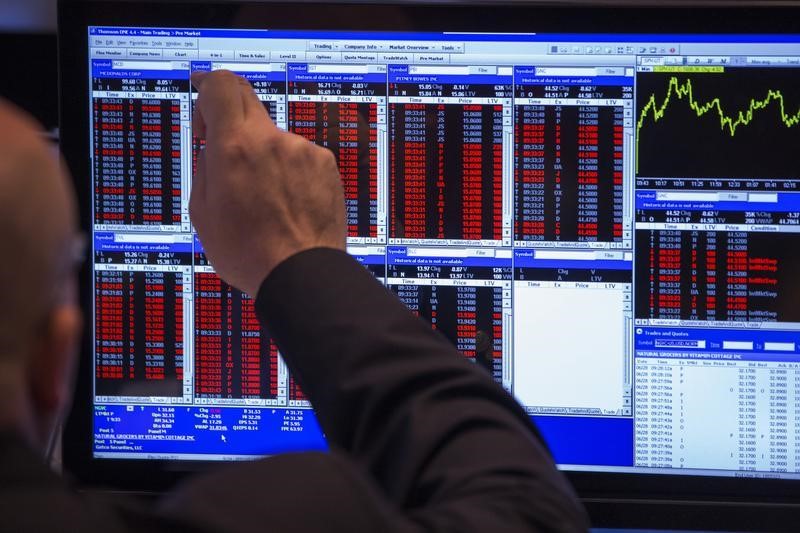© Reuters
biedexmarkets.com — After Friday’s strong jobs report made it likely the Federal Reserve will delay interest rates cuts investors will be focusing on upcoming earnings and economic data to gauge the future path of monetary policy. China is to release what will be closely watched inflation data, oil prices look set to remain volatile and the Reserve Bank of Australia meets. Here’s what you need to know to start your week.
- Earning season continues
Earnings season continues in high gear and results this week will help determine if the rally that has taken stocks to record highs can keep going.
The hit a fresh high on Friday after the , helped by the soaring shares of Facebook parent Meta Platforms (NASDAQ:) and Amazon (NASDAQ:), which rose 20% and 8%, respectively, following their corporate results.
All three major U.S. stock indexes notched their fourth consecutive weekly gains.
While most of the big tech names have already reported, there is still a huge batch of S&P 500 companies due to report this week, including Eli Lilly (NYSE:), Walt Disney (NYSE:), ConocoPhillips (NYSE:) and PepsiCo (NASDAQ:).
Investors will be paying attention to any insight companies give about 2024, with earnings expected to grow faster than in 2023.
- U.S. data
The U.S. economic calendar is considerably quieter after a busy week which included the January jobs report and the Fed’s first meeting of the year.
The main data point to watch is Monday’s for January with economists expecting activity in the sector to have picked up at the start of the year. The Labor Department is to release the weekly report on on Thursday.
Investors will also get to hear from several Fed officials during the week including Atlanta Fed President Raphael , Cleveland Fed President Loretta , Governor Adriana Kugler, Richmond Fed President Thomas and Governor Michelle .
Before that, Fed Chair Jerome is to discuss the economy and inflation risks in an interview to be aired on CBS’s 60 Minutes on Sunday night.
- Oil prices
Oil prices fell by about 2% on Friday and both benchmarks lost roughly 7% on the week as investors recalibrated expectations for a near term rate cut from the Fed, which could dampen crude demand.
But concerns over spiraling tensions in the Middle East look set to remain to the fore after the United States began retaliatory strikes targeting Iran-backed militants in Iraq and Syria late Friday following a drone attack in Jordan last weekend that killed three U.S. troops.
The U.S. and Britain also launched a fresh round of strikes against Houthi targets in Yemen late Saturday following repeated attacks on Red Sea shipping lanes, which are key for global energy flows.
It is the latest escalation in a conflict that has spread into the Middle East since Oct. 7, when the Palestinian militant group Hamas stormed Israel from the Gaza Strip, igniting a war that has drawn in an array of armed groups backed by Tehran.
- China inflation data
China is to publish inflation data on Thursday which is expected to show that deflationary pressures have intensified, with economists expecting January’s consumer price index to come in at minus versus minus 0.3% the prior month.
The world’s second largest economy has been dogged by persistently weak demand, a slowdown in the property sector and fragile investor sentiment.
Chinese markets have already had a brutal start to the year. The blue-chip index ended January down 6%, marking a record six-month losing streak.
As the Lunar New Year looms – ushering in the year of the dragon, traditionally the luckiest of the 12 animals in this zodiac – some are hoping the annual travel rush might be a shot in the arm for the economy.
- RBA meeting
The RBA is expected to keep interest rates unchanged when it holds its first of the year on Tuesday after slower than expected inflation in the fourth quarter prompted markets to bring forward expectations for rate cuts.
Australian consumer price inflation slowed to a two-year low in the fourth quarter, while a sharp deceleration in core inflation fueled bets for a rate cut in May or June.
The RBA has already raised interest rates by 425 basis points to a 12-year high of 4.35% since May 2022 to tame runaway prices. It also left the door open to further tightening if necessary to meet its annual inflation target of 2-3%.
All eyes will be on RBA Governor Michele Bullock as she holds her first post-policy meeting press conference.
–Reuters contributed to this report



